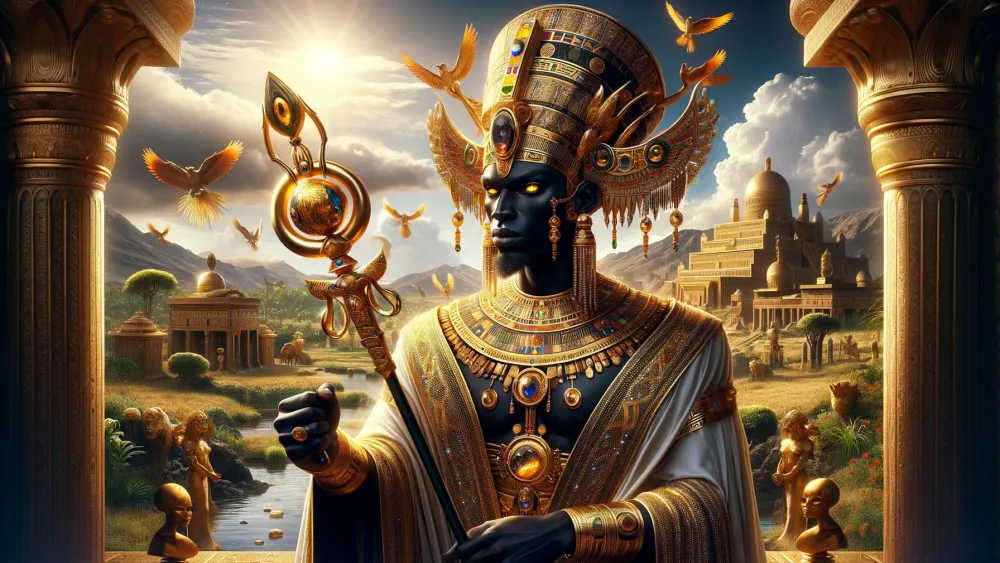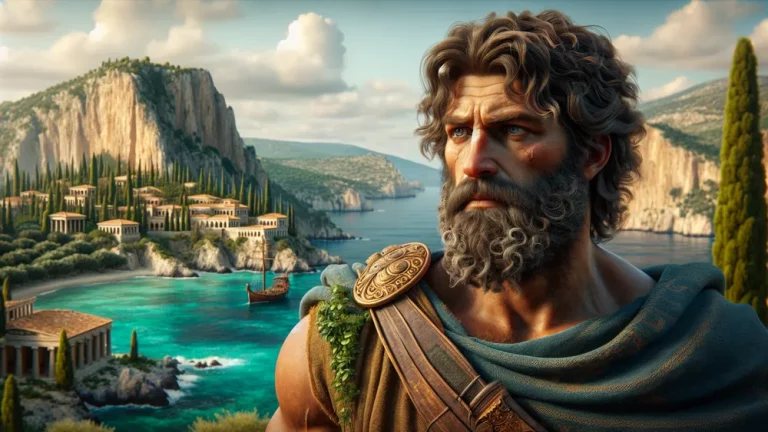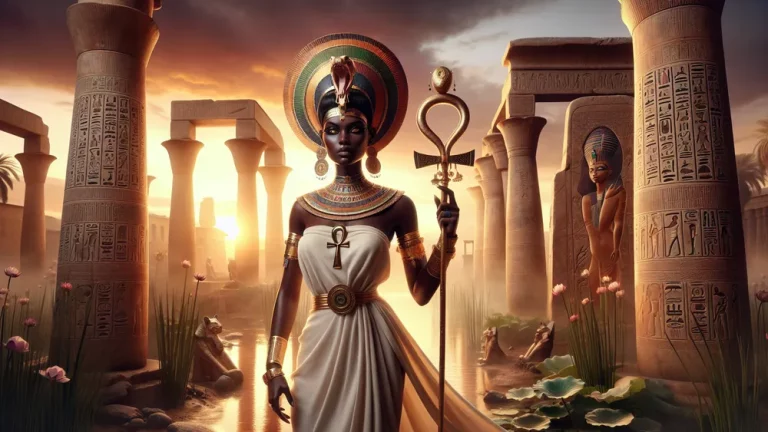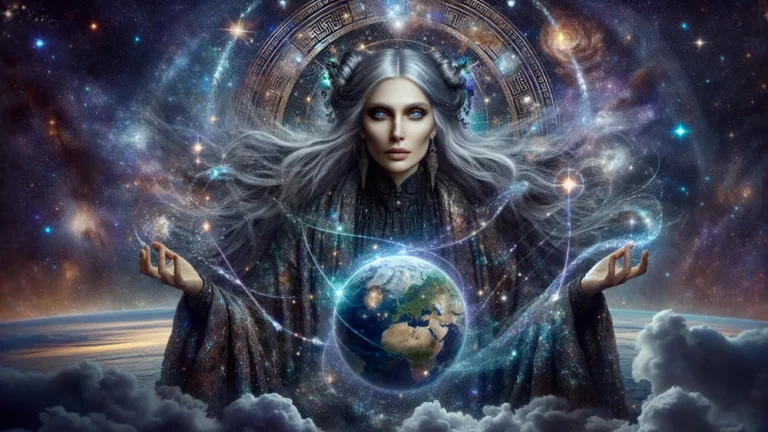Dedun: Ancient Nubian God Of Wealth
In the big mix of old Egyptian and Nubian stories, Dedun is a really interesting god. He was known as the god of money and good times, but he wasn’t just about gold and silver. He also had a lot to do with trade, incense, and how cultures mixed together.
Key Points:
- Dedun, an ancient Nubian god, was worshipped for wealth, good fortune, and trade.
- Originating in Nubia, Dedun’s influence extended to Egypt, symbolizing economic and cultural ties.
- Depicted with symbols like incense and treasure, Dedun represented prosperity and abundance.
- Associated with incense and trade, Dedun played a vital role in ancient Egyptian economy.
- Dedun’s worship evolved over time, reflecting changes in cultural dynamics and beliefs.
- Stories and inscriptions portray Dedun as a guardian of riches and a key figure in trade routes.
- Modern culture still references Dedun in various forms, reflecting his role as a god of wealth.
This blog post will look at where Dedun came from, how people worshipped him, and why he’s still important today. We’ll check out old writings, art pieces, and even how people think about him now. Dedun’s story goes way back and it’s pretty cool to see how he mattered for so long. He’s still fascinating to folks even now!
Dedun: Overview and Key Facts
| Key Point | Details |
|---|---|
| Name | Dedun (sometimes spelled Dedwen or even Dedoun) |
| Role | God of money, good fortune, and trade |
| Cultural Origin | Nubian roots, later mixed into Egyptian stories |
| Main Symbols | Incense, treasure boxes, and sometimes a lion |
| Worship Places | Mostly in Nubia but also known in Egypt |
| Time Period | Worshipped from the Old Kingdom to the New Kingdom and beyond |
| Attributes | Bringer of wealth, protector of trade routes, connected with incense |
| Depictions | Often shown as a man with Nubian features holding incense |
| Related Gods | Linked with other gods of wealth and trade like Hapy and Osiris |
| Importance | Showed the economic and cultural ties between Nubia and Egypt |
| Modern Mentions | Sometimes mentioned in books, movies, and academic papers |
| Key Writings | Found in various old inscriptions and texts |
| Change Over Time | Worship practices changed from Nubian origins to broader Egyptian context |
| Economic Impact | Affected trade and wealth distribution in ancient societies |
| Cultural Impact | Played a role in cultural exchange between Nubia and Egypt |
The Origins and Worship of Dedun
To really get Dedun, we gotta see where he came from. And how folks honored him. Let’s jump into his roots and the ways people showed their respect back in the day.
The Nubian Connection to Dedun
Dedun’s tale kicks off in Nubia, a place south of Egypt, bursting with culture and history. Picture Nubia as that cool friend who always has the best stuff – gold, incense, you name it – and everyone wants to trade with them. Dedun was a big shot there, seen as the god who brought wealth and good vibes. When Egypt and Nubia started hanging out more often, Egyptians thought, “Hey, this Dedun guy is pretty awesome,” so they added him to their own list of gods. Nubia wasn’t just some place; it was a powerhouse of resources and culture. Think of it like the Silicon Valley of ancient times. Here are some key points about Nubia’s significance:
- Rich Resources: Nubia had gold mines and exotic goods that were highly valued.
- Cultural Exchange: Nubia and Egypt shared art, language, and religious practices.
- Strategically Important: Nubia controlled key trade routes, making it a vital partner for Egypt.
So Dedun’s journey from being a local god in Nubia to becoming part of Egyptian mythology shows how these ancient cultures were all mixed up together. It’s kinda like when your favorite indie band suddenly becomes super famous worldwide!
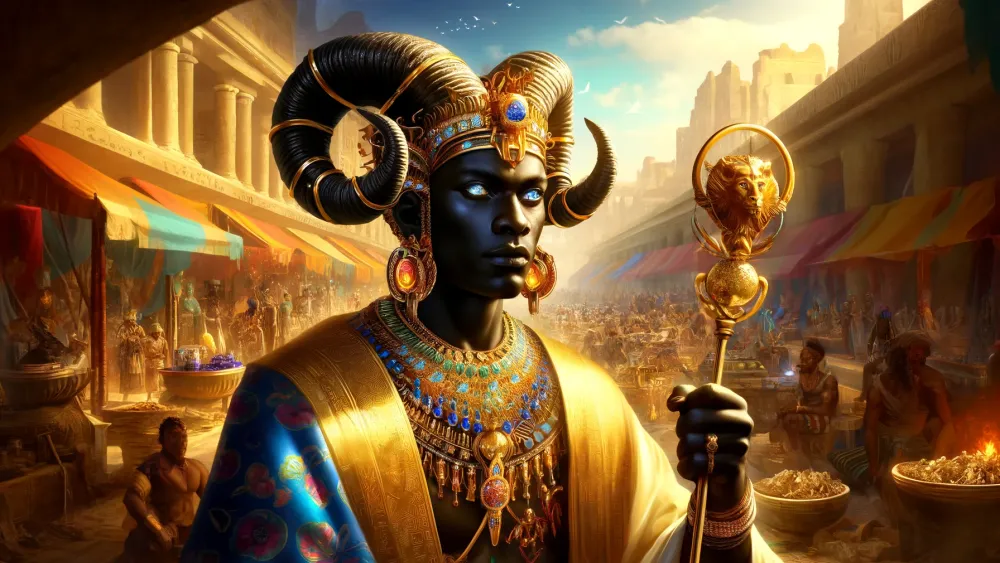
Dedun’s Role in Ancient Egyptian Religion
Dedun found his niche in the Egyptian pantheon, mingled with big shots like Osiris and Hapy. He wasn’t just a background character; he was crucial, especially when it came to wealth and prosperity. Imagine him as the guy who made sure everyone had enough riches to go around. His interactions with other gods were like those of a team player, working together to ensure everything ran smoothly. For example, while Osiris handled the afterlife stuff, Dedun took care of making sure there were enough resources for everyone still alive. This teamwork showed how Egypt and Nubia leaned on each other. Here are some key points about Dedun’s role:
- Wealth and Prosperity: Dedun was the go-to god for riches and abundance.
- Team Player: He worked alongside other gods to maintain balance and prosperity.
- Cultural Bridge: His worship highlighted the strong ties between Egypt and Nubia.
I remember reading about how Dedun often held incense, which was super valuable back then – kinda like holding a gold bar today – showing how his role was tied up with trade and economy. It’s like thinking of a modern CEO who not only runs a company but also engages in international trade to keep things booming!

Symbols and Representations of Dedun
Dedun popped up in ancient Egyptian art in some pretty interesting ways. You’d often see him with a headdress made of ram’s horns, which stood for strength and fertility. He also held incense, a super valuable item back then, showing his connection to wealth and trade. Imagine seeing a statue of Dedun holding incense; it’s like seeing a modern businessperson holding a briefcase full of cash. These symbols weren’t just for show; they told people what Dedun was all about. Here’s a quick look at some of his key symbols and what they meant:
| Symbol | Meaning |
|---|---|
| Ram’s Horns | Strength and fertility |
| Incense | Wealth and trade |
| Gold | Prosperity and abundance |
I remember reading about how these symbols were not just artistic choices but were deeply meaningful. They revealed Dedun’s attributes and powers, making it clear why he was so important. It’s like how a superhero’s costume tells you what they’re all about – like Superman’s “S” symbolizing hope.
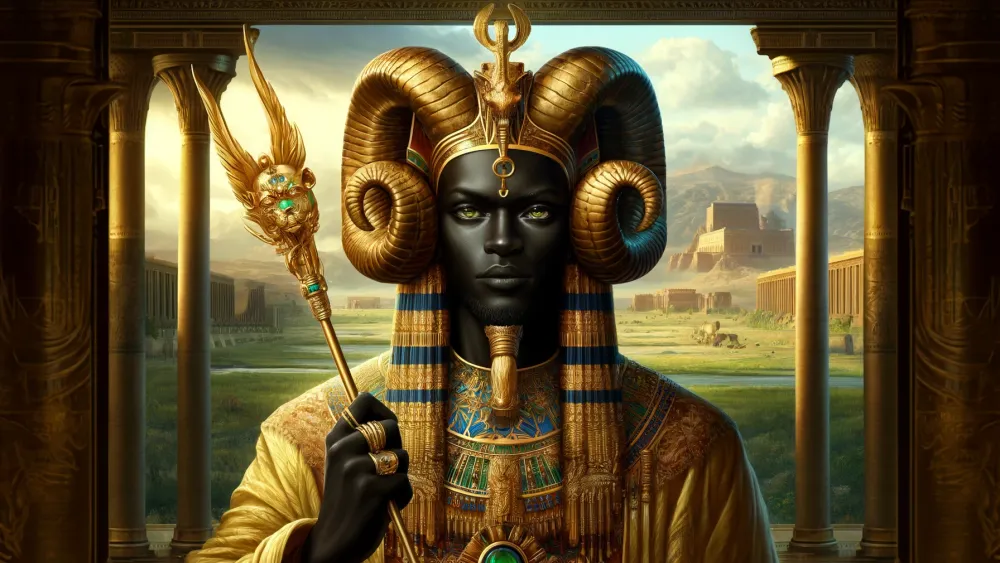
Dedun as the God of Wealth and Prosperity
Alright, so we’ve checked out Dedun’s symbols and what they mean. Now, let’s jump into how he brought wealth and prosperity to his followers.
Dedun as the God of Wealth
Dedun was like the ancient world’s go-to guy for wealth and prosperity. People believed he could bring riches and abundance to his followers, almost like having a magic ATM that never runs out of money. Imagine living in ancient times and thinking, “If I worship Dedun, maybe I’ll get that extra grain or gold I need.” He was associated with wealth in several ways:
- Incense and Trade: Dedun was linked to incense, a super valuable trade item. Think of it like ancient gold or oil.
- Offerings: People would offer him goods, hoping he’d bless them with more wealth in return.
- Symbols of Prosperity: His symbols, like gold and ram’s horns, were all about abundance and strength.
It’s fascinating to see how these ancient beliefs shaped their daily lives and practices.
Dedicating offerings to Dedun, like donating to a charity today, was a way for people in ancient times to seek wealth and prosperity through their beliefs in his powers.
The Association with Incense and Trade
Dedun had this huge link to incense and trade, making him a big deal in ancient Egypt’s economy. Incense was like the ancient equivalent of a high-demand luxury item, kinda like how we see gold or high-end electronics today. People used incense in religious ceremonies, so it was always in demand. Dedun controlled this valuable commodity, which made him a key player in trade.
Imagine ancient traders traveling long distances, bringing incense from far-off lands, and thinking, “If Dedun blesses this trip, I’ll make a fortune.” This trade wasn’t just about money; it was also about spiritual wealth. I once read that temples would burn incense to honor the gods, and Dedun was right there in the mix, making sure everything smelled divine.
It’s wild to think how something as simple as a fragrant resin could hold so much power and significance.
The Evolution of Dedun’s Worship Over Time
Dedun’s worship morphed a lot from ancient days to later times, and it’s pretty wild to see how it all changed. At first, Dedun was a big shot in Nubia, where folks saw him as a major god of wealth and prosperity. As time went on, the Egyptians started to adopt him into their own pantheon, and his role shifted a bit.
He became more associated with trade and incense, which were super important in their economy and religious practices. Imagine how people might have gone from offering simple goods to Dedun in small Nubian shrines to making elaborate offerings in grand Egyptian temples. Over centuries, his significance waxed and waned, kinda like how some celebrities are super famous for a while and then fade into the background.

Dedun in Mythology and Texts
So, we’ve seen how Dedun’s worship changed over time. Now, let’s jump into the ancient stories and writings where he pops up. These texts give us a deeper look into his character and significance.
Dedun in Ancient Texts and Inscriptions
When you dig into ancient Egyptian texts and inscriptions, you find Dedun mentioned in ways that tell us a lot about his traits and importance. For example, some inscriptions call him the “Lord of Nubia,” which shows his strong link to that area. These texts often highlight his role in bringing wealth and prosperity through trade and incense.
Imagine reading an old scroll where a pharaoh thanks Dedun for a successful trade trip – it’s like finding a thank-you note from a king to a god! These references also show how people worshipped him with offerings and rituals to gain his favor. I once stumbled upon a story where Dedun was invoked during a ceremony to ensure a plentiful harvest, which really brings home how integral he was to daily life.

So, these ancient writings give us a window into how people saw Dedun and why he was so important to them.
Ancient Egyptian texts and inscriptions reveal Dedun’s significance through his association with trade, wealth, and prosperity, demonstrating the reverence and importance people placed on him in their daily lives.
Myths and Legends Surrounding Dedun
When you jump into the myths and legends about Dedun, you find some pretty wild stories that tell us a lot about who he was and what he did. One popular tale says Dedun was like a guardian of Nubia’s treasures, protecting all the wealth from invaders. This story shows his strong link to riches and prosperity.
Another legend talks about Dedun giving incense to the gods, which was a big deal because incense was super valuable and used in many religious ceremonies. Think of it like Dedun being the ultimate supplier of something everyone wanted. These stories paint him as a generous yet powerful figure, someone who could bring riches but also had the strength to protect them.

I remember reading a myth where Dedun helped a pharaoh during an economic crisis, which really highlights his importance in keeping things prosperous. So, these legends give us a deeper understanding of Dedun’s multifaceted role in ancient mythology.
Dedun’s Influence on Culture and Society
Alright, so we’ve dug into the myths and stories about Dedun. Now let’s see how his influence spilled over into the everyday lives of people.
Dedun’s Impact on Ancient Egyptian Economy
Dedun’s tie to wealth and trade had a massive effect on ancient Egypt’s economy. People saw him as a god who could bring riches, so they often prayed to him for success in their business deals. Picture merchants trekking long trade routes, carrying goods like gold, ivory, and incense. They believed Dedun watched over them and made sure their journeys were safe and profitable.
These trade routes were like the highways of the ancient world, connecting Egypt with Nubia and beyond. I once read about a caravan that traveled from Nubia to Thebes, and they gave a portion of their goods to Dedun as thanks for a safe trip. This practice shows how deeply his worship was tied to economic activities.
So, Dedun wasn’t just some god in the sky; he was a vital part of everyday life, influencing how people traded and prospered.

Dedun in Modern Culture and Media
Dedun shows up in today’s culture in some pretty wild ways. You might catch him in books, movies, or even video games. For instance, in some fantasy novels, Dedun is this super powerful god who controls wealth and trade, just like back in the day. But sometimes, these modern takes throw a curveball and make him more of a mysterious figure or even a trickster.
I remember watching this documentary where they talked about Dedun’s role in ancient trade routes; it made me think about how different cultures see wealth and prosperity. In video games, Dedun might be a character who gives players special abilities related to wealth or resources – a fun nod to his ancient gig.
So while the core idea of Dedun as a bringer of riches stays the same, modern interpretations often add new layers, making him more complex and intriguing.
Modern interpretations of Dedun in various forms of media add complexity and intrigue to the traditional concept of him as a deity of wealth and trade.
Pantheon of All the Egyptian Mythology Gods
When you dive into ancient Egyptian mythology, you find a huge mix of gods and goddesses, each with their own stories, powers, and roles. From Ra, the sun god who lights up the sky every day, to Osiris, the god of the afterlife who judges souls – there’s so much going on. And then there are lesser-known figures like Dedun, who handles wealth.
If you’re curious about these fascinating deities and want to know more about them all in one place, check out this Egyptian gods list. This guide will give you a deeper look at the many gods and goddesses that were super important in ancient Egyptian culture and religion.
FAQs
1. Who was Dedun in ancient Egyptian mythology?
Dedun in ancient Egyptian mythology was a Nubian god associated with wealth, prosperity, and the trade of incense.
2. How did Dedun’s worship reflect the relationship between Egypt and Nubia?
Dedun’s worship reflected the relationship between Egypt and Nubia by symbolizing the economic and cultural exchanges that were integral to their interconnected histories.
3. In what ways was Dedun associated with wealth?
Dedun was associated with wealth through his role as the god who brought riches and abundance to his followers.
4. How did the representation of Dedun change over time?
The representation of Dedun changed over time as he evolved from a Nubian deity to being integrated into the Egyptian pantheon, reflecting shifts in cultural and political dynamics.

